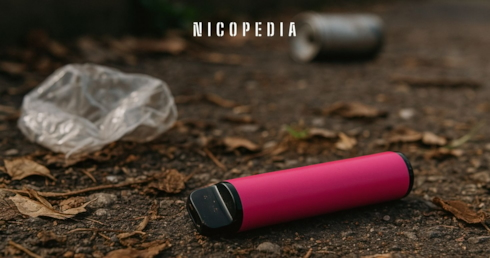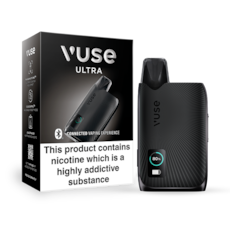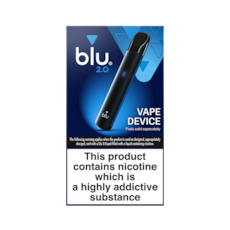Hi! Did you know that you can easily reorder a previous order on My Pages? Just click “reorder” to get all your favourites delivered again.
Published 2025-04-29
Why Are Disposable Vapes Banned?
The UK government is set to ban disposable vapes from 1 June 2025. This move addresses the pressing concern of environmental harm.

Key Takeaways
- Environmental harm is the core reason for the UK’s disposable vape ban.
- 5 million disposables are discarded weekly — most are not recycled.
- Ban takes effect 1 June 2025 — alternatives like pod kits and nicotine pouches remain available.
Disposable Vapes and the Environmental Cost
The UK government’s decision to ban disposable vapes stems from one key issue: environmental damage.
Disposable vapes are single-use electronic devices made with plastic casings, circuit boards and lithium-ion batteries.
They’re not designed to be taken apart or recycled easily — and most of them end up in the bin.
In 2024, research from Material Focus estimated that nearly 5 million disposable vapes were thrown away each week — a fourfold increase from the previous year.
These aren’t being recycled properly. They're being dumped, burnt, or worse, tossed onto the street.
And the impact adds up. In 2022 alone, over 40 tonnes of lithium were discarded via disposable vapes — enough to build batteries for around 5,000 electric vehicles.
Most of this ends up in landfills or incinerators.
The real danger comes from the batteries. When damaged or crushed, they can easily catch fire.
According to Material Focus, around 700 fires across the UK waste stream last year were linked to hidden batteries inside electrical items like disposable vapes.
Electronic Waste Meets Poor Design
Part of the problem lies in how disposable vapes are made.
Unlike reusable devices, which allow for battery removal and recycling, disposables are manufactured as sealed units.
Battery, casing, and circuit board are fused — which makes recycling virtually impossible.
According to a Sky News and Bureau of Investigative Journalism investigation, millions of disposable vapes are ending up in landfill each week — despite containing recoverable lithium and other valuable materials.
Their construction makes them difficult to dismantle safely, and as a result, most are not recycled at all.
This has raised serious concerns among waste management experts and environmental organisations.
Youth Vaping — A Parallel Concern
While youth vaping is not cited as a reason behind the disposable ban, it remains an area of ongoing scrutiny.
Surveys have shown a rise in underage vaping in recent years.
Concerns have been raised about flavours, packaging, and branding that could appeal to younger audiences.
These worries have sparked other regulatory proposals — such as plain packaging and flavour restrictions — but they’re separate from the environmental rationale behind banning disposables.
These strategies mirror those implemented for tobacco products.
In 2016, the UK enforced the Standardised Packaging of Tobacco Products Regulations, mandating plain packaging for cigarettes and hand-rolled tobacco.
This initiative aimed to discourage people from smoking by diminishing the attractiveness of tobacco products.
Alternatives to Disposable Vapes
If you're used to disposables and wondering what’s next, there are other options.
Refillable vape kits and pod systems generate less waste because they are rechargeable and refillable, which means users may dispose of fewer components over time compared to single-use vapes.
There are also nicotine pouches, which offer an alternative that doesn’t rely on electronic components.
To learn more, check out our article detailing what vapes you can use after the ban takes effects.
Industry Pushback and What’s Next
There’s concern about how the ban might reshape the market.
In a recent survey conducted by Haypp, 34% of disposable vape customers said they would consider buying illegal vapes once the ban is in place. 90% of respondents also believed that the ban would lead to an increase in black market activity.

While the full impact remains to be seen, the figures suggest that demand could shift underground, making regulation and waste control even harder.
Others argue the focus should be on building better recycling infrastructure, not banning products outright.
From the government’s point of view, the line is clear: disposable vapes are unsustainable, hard to recycle, and a rising hazard in the waste system.
"Not only are disposable vapes often targeted, unacceptably, at children – they also represent a huge and growing stream of hard-to-recycle waste, with nearly 5 million thrown away every week,"
The simplest solution is to phase them out.
When Will the Ban Happen?
The UK government has announced the ban will come into effect from 1 June 2025.
Retailers have been given a strict deadline to clear all remaining stock and adapt their operations before enforcement begins.
On Haypp, the last day to place an order for disposables will be 31 May 2025.
Consumers will still be able to buy refillable or rechargeable alternatives — but the single-use vape era is coming to a close.
Why are Disposables Banned FAQs
What is the main reason disposable vapes are being banned?
The ban targets the growing environmental impact of disposable vape waste.
Are disposable vapes being banned because of youth vaping?
While youth vaping is a concern, the government's primary rationale for the ban is environmental.
Can I still buy reusable or refillable vapes after the ban?
Yes, the ban only applies to single-use vapes — reusable devices will still be legal.
What happens if I still have disposables after 1 June 2025?
The legislation prohibits the sale and supply of disposable vapes from 1 June 2025. However, it does not criminalise possession or personal use of existing products.
What should I use instead of disposables?
Refillable pod kits and nicotine pouches are two widely available alternatives.




